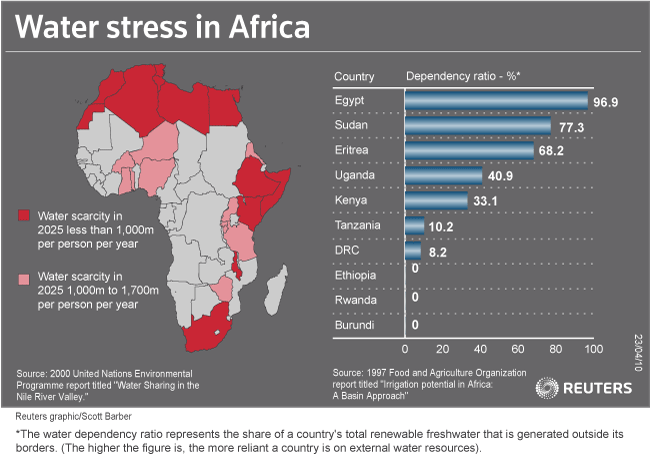
Now, Egypt has a population of 95.69 million, which was last measured in 2016 meaning they may have reached 100 million. As well as, more than 22 million people in Egypt are poor, and use the Nile for just everyday needs. How many people would have to change their lifestyle just because the Nile is not free for them to use anymore?
Second, I have spoken about the 1929 Nile water agreement, granting Egypt the Entire Nile because it was found that they relied on it the most. Yet that is a long time ago, what if another country needs it more now, and the agreement doesn't make any sense anymore. Some people would think that, others think that it has already been made official, even if it was long ago, that the Nile belongs to Egypt, and that there is no reason to change that. Not to mention that Ethiopia's Renaissance dam is starting to be viewed as a threat because of the following reason: Few nations rely so completely on a single river as much as Egypt does. The Nile provides over 90 per cent of Egypt's water supply. Around 60 per cent of Egypt's Nile water originates in Ethiopia, so building a dam would leave Egypt with only 30% coming from the nile, and another 10% from other small sources. It would lead Ethiopia out of poverty and Egypt into it.
Lastly, Groundwater in both Sudan and Ethiopia are from 1,000 to 10,000 m deep while Egypt’s ground water is at 50,000m meaning it is harder to acquire it in Egypt. Ethiopia and Sudan can both extract ground water in an easier way, while Egypt cant. So it’s better that Egypt owns the nile so that they have the resource right there. Extracting ground water would of-course be a little expensive, yet it would cost Egypt much more.
The Nile River
Water Conflict
First, if you do not know what water conflict is please click here
This specific water conflict is between three major countries in Africa:
-
Egypt
-
Ethiopia
-
Sudan
These other countries have very little of the Nile water in their area yet are still involved:
Each one of these countries depend on the Nile river for great things. Most of them being freshwater, without the need for expensive ways or desalination. Others it is because it helps with agriculture and irrigation for their lands without again, having to spend much money. It serves as something for people to see, tourism, although this option is mostly in Egypt, since for most people it belongs to them already.
Over many years, countries have not really fought over it, but rather argued. Not only these 3, but all countries that use it, even if they use 2% of it, they are still included in this conflict unless they choose not to and leave the fait of the river upon other countries.
In the past, there has been the 1929 Nile Water Agreement. This agreement was made between the UK and Egypt, during 1929. The agreement states that due to the fact that Egypt was more dependent on the Nile’s water, Egypt is therefore allowed more access to it, and had the power to prevent other Nation’s that are part of the Nile Water Basin from building on it. Because this agreement has never been repealed, Egypt still has the same power.
Egypt:
Perspectives
Sudan:
First, in Sudan , Petroleum is one of Sudan's greatest, and major resource. It also has a significant amount of chromium ore, copper, iron ore, mica, silver, gold, tungsten, and zinc. Like I have mentioned before, this means that Sudan can make money off of all of these resources, and make a deal with the countries, or even buy a desalination center, or anything to help them with having more water.
Second, Sudan being a country with very hot climate, and 40 million people, would obviously need large amounts of water. Having the Nile river as its major freshwater source, is not very helpful either. Yet,
more than 80% of the population rely greatly on ground water, as it is more readily available than other water resources during the long dry season. Meaning that they can extract groundwater as mentioned before, easier than Egypt or Ethiopia can. With the money from their resources, they could maybe find a new way to extract ground water which doesn't involve a lot of work and expenses.
Ethiopia:
First, Ethiopia probably has the largest population out of all three countries. For some people, that would be enough, yet for others they would argue opposite. Since Ethiopia has such a large population, and most of it poor, what makes people think they can take care of the longest river in Africa? They could maybe even use a lot of it and cut off the water completely or leave very little for the countries on top .
Second, is their Renaissance dam. This dam, that took 4 million euros and 6 years to build. For Ethiopia, this dam means hope. Hope to get out of poverty and lead a normal life. For the countries north, this means fear. Fear that the dam will take all the water away, and they will not know where or how to get water from.
Internal government studies estimate that for every reduction of 1 billion cubic meters of water, 200,000 acres of farmland would be lost and livelihoods of 1 million people affected, since an average of five people live off each acre, there will be many lives lost. If Ethiopia decides to use their dam in a harmful way wether it is on purpose or not, they will end many lives since there are many poor people in both Sudan, and Egypt.




Ground Water Extraction
in Africa




